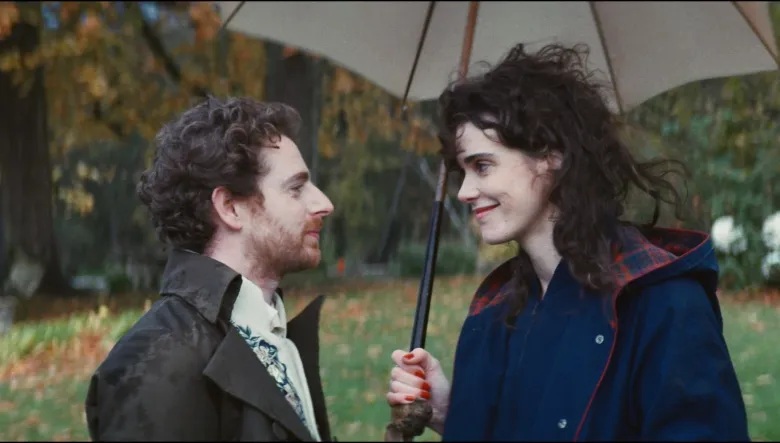Jane Austen Wrecked My Life (Piani, 2025)
As a longtime scholar of Jane Austen’s fiction and a self-professed snob about films derived from it, the biggest compliment I can pay to Jane Austen Wrecked My Life is that it does not feel like a knock off or a piece of fan fiction.
In an early scene, Agathe (Camille Rutherford), sells Austen’s fiction at a Paris bookshop, and the dialogue is not promising. When pressed with the question of which Jane Austen character she identifies with – a question no true Janeite would not roll her eyes at – she professes solidarity with Anne Elliot of Persuasion, because, she claims, Anne is old and “withered.” Anne is not either of those things, but then neither is Agathe. At least not yet.
I subscribe to the theory that if you have ever taken a Facebook quiz to tell you what Disney princess you are, which Hogwarts school the sorting hat will put you in, which member of the Fellowship you are (does anyone ever get told he is Boromir?), or which Austen heroine you are, then you are not really a true fan. Knock offs (I’m looking at you Jane Austen Book Club) clumsily try to underline the parallels between Austen’s plots and situation, but Austen’s richness for characterization is too often undersold by such attempts. If it weren’t, there would be no difference between Elizabeth Bennett and any other poor but proud heroine, nothing to distinguish Emma Woodhouse from any other spoiled rich kid who eventually reforms.
I suspected the film was going to be better than I anticipated when I stopped trying to fit Agathe into a predetermined Austen mold. I knew it when I realized I did not know who, if anyone, she would end up with. The two most likely candidates are Felix, a friend and companion who sends Agathe’s manuscript to a Jane Austen residency and Oliver, the stuck-up son of the residency’s proprietors, to whom Agathe takes an instant dislike. The story could go one of several ways and still claim to be channeling a well-known Austen story. In some, friendship deepens into romantic love. In others, passion overcomes initial errors and problems. Once it became clear that the film wasn’t retelling any particular Jane Austen novel, it became more interesting in its own right.
Another element of the story that I appreciated is that it recognized that while Jane Austen’s writing continue to hold vast cultural interest, the contemporary world is different from the Regency period that many of Austen’s characters lived in. Yes, themes can be timeless, but people trying to pattern their lives (or fiction) after those of a different time period dismiss too quickly the impact that time and place can have on character development. To cite just one example, Agathe occupies a world in which sex before marriage is culturally accepted. The taboos and restrictions she must navigate would be out of place if shoehorned into a contemporary story. Instead, the film leans heavily on internal conflicts rather than external obstacles to love.
When Felix drives Agathe to her residency, they share a moment while listening to a radio song where the lover claims, “I love you in the Italian way…” Attentive viewers may make connections between the song’s lyrics and the characters’ own attitudes towards passion and love. More careful viewers may note, in turn, that Agathe’s manuscript is prompted by a sensual daydream fueled by a solitary meal and some Japanese sake. In a lesser movie, such moments would be underlined thrice, pieces of overdetermined foreshadowing or shortcut labeling that identified the characters too closely with one entire system, period, or worldview.
Refreshingly, though, the film declines such shortcuts in favor of character development based on personal experience. Agathe has writer’s block. It’s not that she wants some sort of love of a bygone era as that she longs for she knows not what. Let other writers and residents – most notably a strident feminist – plant their flags firmly in the midst of well-defined ideas. Agathe wants to make her own choices. Perhaps in that way, the film does work its way back to Persuasion, but if it does, ironically, the modern avatar of Lady Russell, the well-meaning but incorrect dispenser of advice, is Austen herself. The only way Jane Austen or her fiction can ruin one’s life is if one becomes so infatuated that one drowns in it. For all the differences between Austen’s women, they share at least one common situation with each other and with the modern readers who love them: they each have someone (often multiple someones) more than ready to tell them how to live their (love) lives. Not all the advice they receive is bad, but they achieve maturity and happiness to the extent they learn to measure that advice against their own hearts’ desires and heads’ hard-won wisdom.
If we can learn to do the same, Jane Austen might just enrich our lives rather than wreck them.

